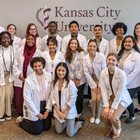Medical students who wanted to take a shot at fighting COVID-19 have found they came to the right place. Kansas City University was one of the first medical schools in the country to develop a plan to induct medical students into the frontline volunteer workforce to administer vaccinations.
Just as it did at the onset of the pandemic, KCU once again quickly flexed its programming to train and certify first- and second-year osteopathic medical students to vaccinate for COVID-19. This would serve to ease the strain on overworked health care providers as they scrambled to vaccinate the community, particularly those who were most vulnerable.
“Many students felt intense helplessness and sadness, as the pandemic began and everything closed,” said Neha Singh, a second-year medical student at KCU. “We are young, healthy, and want to reduce the burden in hospitals.”
Today, they are doing just that. KCU student and faculty volunteers work in a special clinic held on the KCU-Kansas City campus, in collaboration with the Kansas City, Missouri Health Department. Additionally, KCU students volunteer at Federally Qualified Health Clinics (FQHC) and HCA-affiliated clinics. and mass drive-through clinics organized by the National Guard.
Students from the KCU-Joplin campus are administering the vaccine into the arms of people who sometimes travel long distances to become vaccinated in mass drive-through clinics organized by the National Guard.
“We are working with the National Guard in two districts that are providing vaccines for the rural communities because patients can’t always get to the larger cities,” according to Darrin D’Agostino, DO, executive dean and vice provost for Health Affairs. “I’m very proud of our students from the Joplin campus who are willing to travel to places that are farther away. This is really an effort that is coming from the hearts of students who want to serve and help, wherever they are needed.”
KCU students are trained, certified and vaccinated prior to volunteering. Faculty and staff work with local providers to schedule the volunteer workforce, easing another burden health departments and hospitals face, not to mention what it does for students who are eager to get out of their books and help real people.
“It’s a tremendous pre-clinical experience,” said Bruce Williams, DO, associate dean for clinical education. “First- and second-year student experience is centered on classroom work, labs and simulators. The opportunity to work with actual patients and provide actual care is something they really embrace.”
Singh says it is an opportunity to make a difference.
“Our volunteer sign-ups fill up within two minutes of an email being sent out, even on exam weeks,” she emphasized. “Everyone wants a chance to volunteer and be a part of the solution. After vaccinating thousands of people at KCU, we've definitely saved multiple lives now. Very few students get to say that this early in their medical journey.”
Despite the rigorous schedule for medical school that must be kept, KCU students can have confidence they will have the time flexibility to volunteer due to months of planning. “It’s hard to change your curriculum, and to liberate students,” said D’Agostino. “We had some foresight and we created a way that allows students to have time, so that they can do these types of things during the pandemic and help become part of the solution for their communities.”
This is the second time in KCU’s 105-year history its first- and second-year students have been asked to join the ranks of health care professionals in the midst of a pandemic. Kansas City University students were asked to treat patients in Kansas City during the Spanish flu pandemic of 1918. Then and now, student doctors answered the call to serve.
“They have been soldiers against COVID-19 and will help stop this pandemic with their important work,” said KCU President and CEO Marc B. Hahn, DO. “In doing so, they are being asked to step in to practice earlier than most medical students. They will hold a special place in KCU history.”
While Singh says she welcomes the opportunity to be part of this moment in medical history, she is also learning about the power of public health, and believes today’s clinics will benefit patients in the future.
“COVID-19 highlights the idea that we as medical students must learn to treat our patients equally and get rid of our biases. People live in multi-generational homes, have essential jobs, lack of health insurance, and many lost loved ones during this pandemic. COVID-19 reminded me that no matter what my grades are, I can become the physician I hope to by learning how to adapt to my patients' needs and circumstances.”
As more doses become available, KCU students are prepared to volunteer until the entire community is vaccinated. D’Agostino says they will be there as long as the community needs them, which speaks volumes about the kind of physicians they will eventually become.
“They are awesome. They are volunteering. They want to be on the front line, they’re taking care of business they’re helping save lives by getting vaccines into the patients who truly need them.”
Other vaccination stories about KCU in the news:
COVID vaccines for Missouri teachers gain priority under federal directive, photo and caption at bottom story, The Kansas City Star, March 8, 2021.
KCU medical students administer vaccines, The Northeast News, March 3, 2021.
Mass vaccination clinic in Carthage draws hundreds locally, regionally, The Joplin Globe, March 2, 2021.
Missouri’s COVID-19 vaccine strategy shortchanges KC’s most vulnerable, officials say, The Kansas City Star, Feb. 25, 2021.
KCU students serve community with clinic, receive hands-on experience, The Joplin Globe, Jan. 29, 2021.
_20240119154035_0.png?w=140&h=140)
_20230113185450_0.jpg?w=140&h=140)

(0) Comments